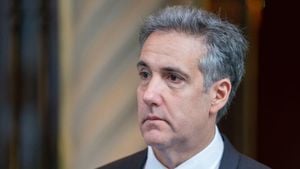A troubling issue resurfaced on November 27, 2024, as New England Patriots safety Jabrill Peppers returned to practice amid serious allegations of domestic violence. Two days after his arrest on October 9 for allegedly shoving his girlfriend's head against the wall and choking her, Peppers was placed on the NFL's Commissioner Exempt List. This list temporarily restricts players from participating in activities with their teams during investigations of serious violations, including domestic abuse. Now, after missing seven games, Peppers has been cleared to attend practices, yet his situation remains precarious.
Peppers' first day back at the Patriots' facility marked a significant moment both for him personally and for the NFL, which is under scrutiny for handling domestic violence cases. The safety expressed uncertainty about when he might fully return to gameplay, admitting his legal team is cooperating with the NFL’s investigation but remaining unclear on its timeline. "We’re still waiting to see what happens next," Peppers disclosed.
The NFL's protocols concerning allegations like Peppers' aim to balance player rights with the need to address serious allegations within their ranks. During this investigation period, the NFL reviews all evidence, including the police report and any corroborative accounts, to determine the next steps, which might include disciplinary action or even potential suspension depending on the investigation's conclusions.
Colleges across the nation remain equally focused on how domestic violence cases are handled, especially concerning student-athletes. With several universities reporting incidents of domestic violence involving their players, institutions are being urged to establish clearer policies and enforcement measures to protect all students and provide support resources to survivors.
Public opinion on domestic violence cases involving athletes has become increasingly vocal, with fans and advocates calling for stronger accountability measures. These cases not only highlight personal issues but also reflect broader societal challenges concerning how domestic abuse is perceived and responded to, reinforcing the need for cultural change within sports organizations.
Change advocates suggest several approaches for the NFL and colleges, such as improved education around consent and healthy relationships for athletes. Training programs and collaborations with addiction services and mental health resources are being pushed as steps toward preventing future incidents.
Nonetheless, how sports organizations respond to these allegations continues to shape the conversation around the treatment of domestic violence cases. Each incident brings to light the prevailing double standards often found between the treatment of male athletes and the gravity of their offenses. Advocates insist the focus must shift from merely punishing individuals to fostering genuine accountability frameworks and survivor support.
The recent events surrounding Peppers serve as yet another reminder of the complexity of addressing domestic violence. The intersection between sports culture and issues of abuse raises questions about how leagues can cultivate an environment of respect and responsibility.
Peppers' next court appearance is scheduled for January. Until then, his position on the Patriots will be closely monitored as he navigates through this personal and professional turmoil. Meanwhile, the NFL is expected to maintain its investigation diligence, aiming to uphold its stated commitment to address all forms of player misconduct comprehensively.
Fans, domestic violence advocates, and the general public will undoubtedly continue to watch as Peppers and the NFL face intense scrutiny over the handling of this case. The justice meted out by the courts, alongside the league's response, could set important precedents for future cases.



